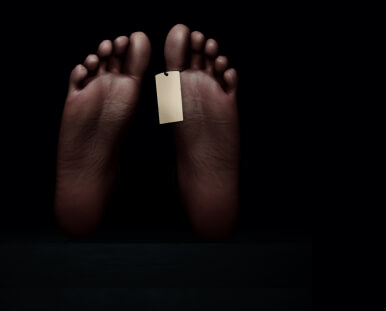By Rachel Lamb . 08/06/2018 · 6 Minute read
When your job revolves around caring for people and making them better, the prospect of them not recovering is a daunting one. The sad truth is that no matter how hard we try, we simply cannot save every patient; sometimes their injuries or illnesses are just too great. That's a key thing to remember when you take your first official role in a hospital.
Emotions are going to affect you
You're human. Humans have emotions.
To provide a great experience of care, your patients will need to trust you and feel comfortable in your presence, and that requires forming a bond with them. For that reason, a patient dying can trigger certain emotions, including sadness, grief, guilt and anger. You may also experience a loss of confidence or a feeling of failure.
As a first-timer, it can be quite scary admitting that you feel any emotions surrounding a patient death. You don't want to seem weak or incapable of doing the job you've worked so hard for.
Here's a secret - plenty of the most experienced healthcare professionals feel a sense of grief or loss over patients who have passed away. Want to know something else? Most of them will tell you that patient death never gets easier. You do, however, get better at handling them over time.
If you are experiencing any of the emotions associated with patient death, don't be ashamed or afraid to express them.

How can you cope with your first patient death?
It's not easy to accept that a patient has passed on, but acknowledging the death is the right place to start. You might also find it helpful to:
Talk to friends or colleagues - tell them how you're feeling about the death of your patient instead of keeping your emotions hidden. Talking about your feelings will help you to manage the rest of your shift with less stress.
Comfort the patient's loved ones - this can also be comforting to you. However, be sensitive to the family's feelings and do not place your emotions above theirs. Remember that despite this being a difficult experience for you, it is potentially devastating for them.
Accept the nature of your job - even though it's hard to do, accepting a patient death as something that occurs in your line of work will help you deal with it going forward.
Know when you're not ok - and see a GP if you feel that a patient death is severely affecting your life, either professionally or personally.
Ask colleagues for advice - many of your co-workers will have experienced this before, so you might find asking for advice on dealing with patient death helpful. Keep in mind that some people don't like to revisit difficult memories, so avoid pushing if they're reluctant to share them with you.
Understand your emotions - it's natural to grieve for someone who has passed on, even if you only knew them in a professional context. It's important to continue with the great work you do, but don't deny yourself the opportunity to grieve, however small a time that may be.

What's it like to experience a patient death?
If you're still a healthcare student (or fortunate professional), you may not have experienced patient death just yet. For those of us who don't know what to expect, we spoke to Your World Clinical Advisor and former nurse, Sarah Milliner-Crewe, who was kind enough to share the story of her first patient death:
"The first experience I had was when I was a student nurse with an elderly patient. She had rheumatoid arthritis and a physical disability, which required a raised shoe. She was admitted with Pneumonia and wasn't for resuscitation. She had never married and originally came from deepest Wales, so her only family was a nephew who lived locally.
On my shift, I went to see her and she had deteriorated further. We knew she was dying and decided to switch her from the main ward to the side room, so she had some privacy, dignity and peace. At the time, I was being supported by a very good staff nurse, who helped me.
As the patient continued to deteriorate, we tried to make her comfortable in bed with any medication prescribed. She had one brown cardigan with her that she didn't want to let go of - it was almost like a comfort blanket for her, so we made sure she had it.
"She was all alone with a brown cardigan for her only comfort..."
We called her nephew and informed him that she was dying but he did not want to come in and see her. That made me really sad as this woman had no one close to comfort her when she was living her final moments. She was so alone and I couldn't help wondering if perhaps she never married because of her disability.
She became really breathless and started Cheyne-stoking (irregular breathing when the patient is close to death) and she died shortly after. Although I have experienced many patients dying since then, she has always been someone that really upset me; I felt so sad that she was all alone and the brown cardigan seemed to be her only comfort.
"I've always treated dead patients with the same care as when they were alive..."
The staff nurse helped me to wash her and prepare her to be taken to the morgue. It's a privilege to complete that last element of care for someone you have looked after up until their death; it's the final bit of dignity you can give someone and I've always done it with as much care as when they were alive. I actually used to continue to talk to them as we were washing and making them 'comfortable' for the last time."









